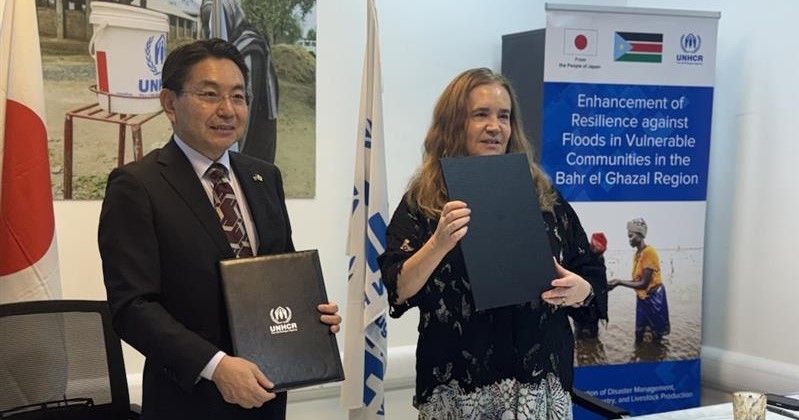The government of Japan, through its embassy in South Sudan, on Tuesday signed a USD 2.5 million funding channelled through the UN Refugee Agency (UNHCR) for a flood resilience project in South Sudan.
South Sudan is on the front lines of the climate crisis. Last year alone, 1.4 million people were affected by floods and other climatic shocks, with an estimated 380,000 forcibly displaced, while floods continue to destroy homes, wash away crops, kill livestock, and erode people’s livelihoods.
Speaking during the signing of the memorandum of understanding for the project in Juba, Odagiri Toshio, the Japanese Ambassador to South Sudan, said the devastating floods that have ravaged parts of South Sudan, highlight the urgent need for immediate and sustained action.
He said the project is a significant step in addressing the urgent challenge caused by the floods, including strengthening early warning systems and disaster preparedness, improving infrastructure, including climate-resilient shelters and water and sanitation facilities, and promoting sustainable livelihoods through solar irrigation and agroforestry.
“The USD 2.5 million contribution will provide essential support to over 25,000 people, improving food security, health, and overall well-being of the most vulnerable populations, including refugees, internally displaced persons (IDPs), and host communities, in Northern Bahr el-Ghazal and Warrap states,” Amb. Toshio said. “Expanding inclusive social services and strengthening systems that support vulnerable populations, including internally displaced persons and refugees, is one of the key pillars of Japan’s efforts in South Sudan.”
Adding: “Japan has also played a leading international role in disaster risk reduction under the 2015-2030 Sendai Framework.”
The envoy said the project directly contributes to the Sendai Framework’s goals by strengthening disaster preparedness and resilience, which aligns perfectly with Japan’s commitment to building resilient societies as showcased at TICAD9.
“It is a commitment to creating a future where the people of South Sudan are better equipped to face the challenges of climate change and conflict,” Amb. Toshio stated. “This future will be achieved through the collaborative efforts of Japan, the UNHCR, the government, and the communities themselves.”
For her part, Marie-Helene Verney, the UNHCR Representative to South Sudan, said the project will help families put food on the table, rebuild their livelihoods, and reduce the risk of being displaced again.
“We are grateful to the Government of Japan for its commitment to address climate change and recognising the link between climate-related disasters and forced displacement,” she said. “This project will give communities the means not only to cope with the next flood, but to adapt, recover, and plan for the future.”
Meanwhile, Joseph Africano Bartel, Undersecretary for Environment at the Ministry of Environment and Forestry, said the contribution of the Japanese Government to the project will contribute to mitigating the impacts of climate change.
“I am happy because the Japanese Government is contributing to the project that we are working on together with WFP and UNHCR,” he said.
Africano said the government developed a USD 50 million project with the Global Environment Facility (GEF), where they will partner with the UNHCR and WFP to get more funds to build the resilience of the people in Northern Bar el Ghazal and Warrap states.
“We believe there are very many projects that need support, and we will always collaborate with you and all our development partners to build the resilience of this country and make sure that we don’t only deal with humanitarian assistance, but balance humanitarian assistance and development, such that we can have peace through development,” Africano said.




